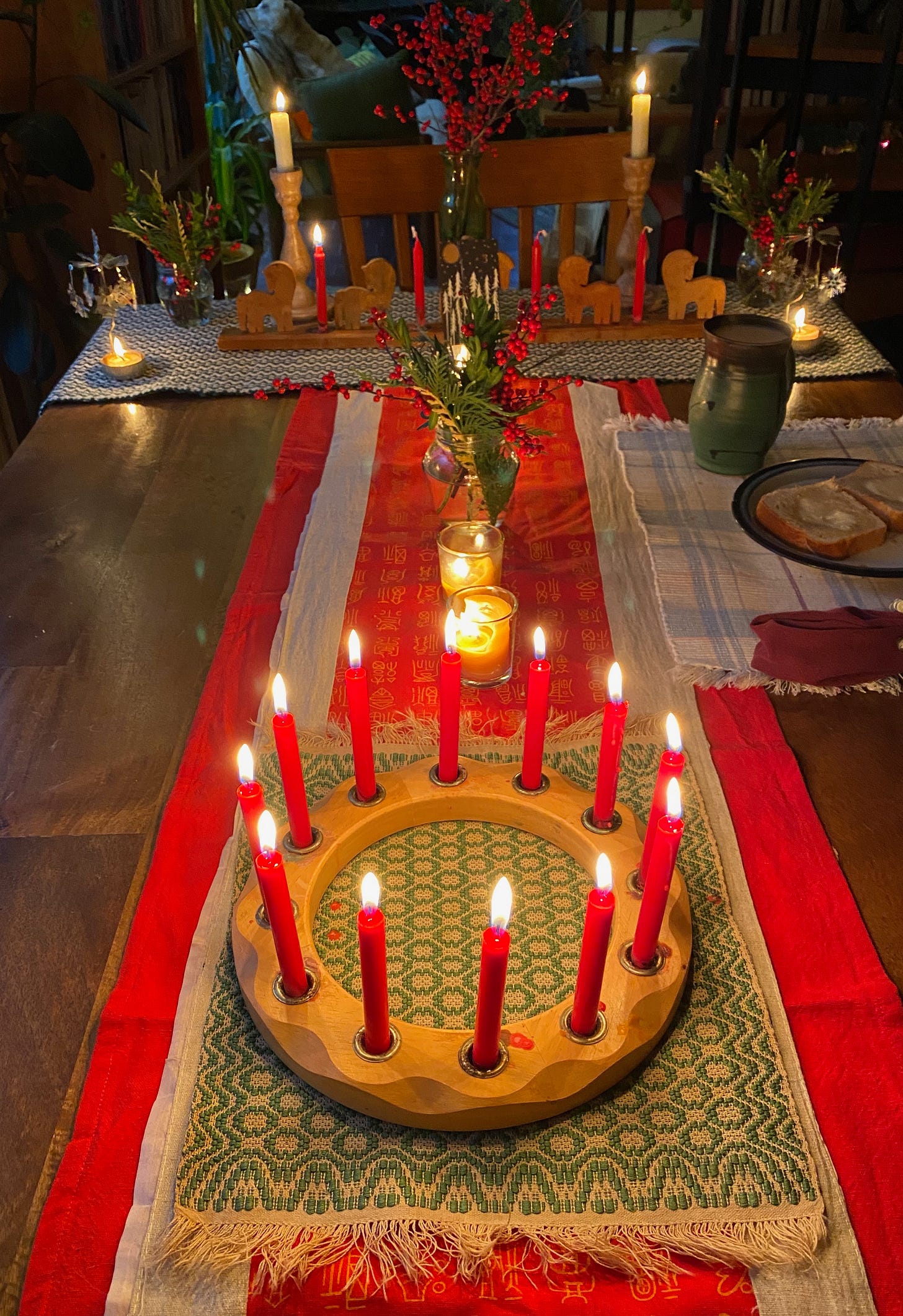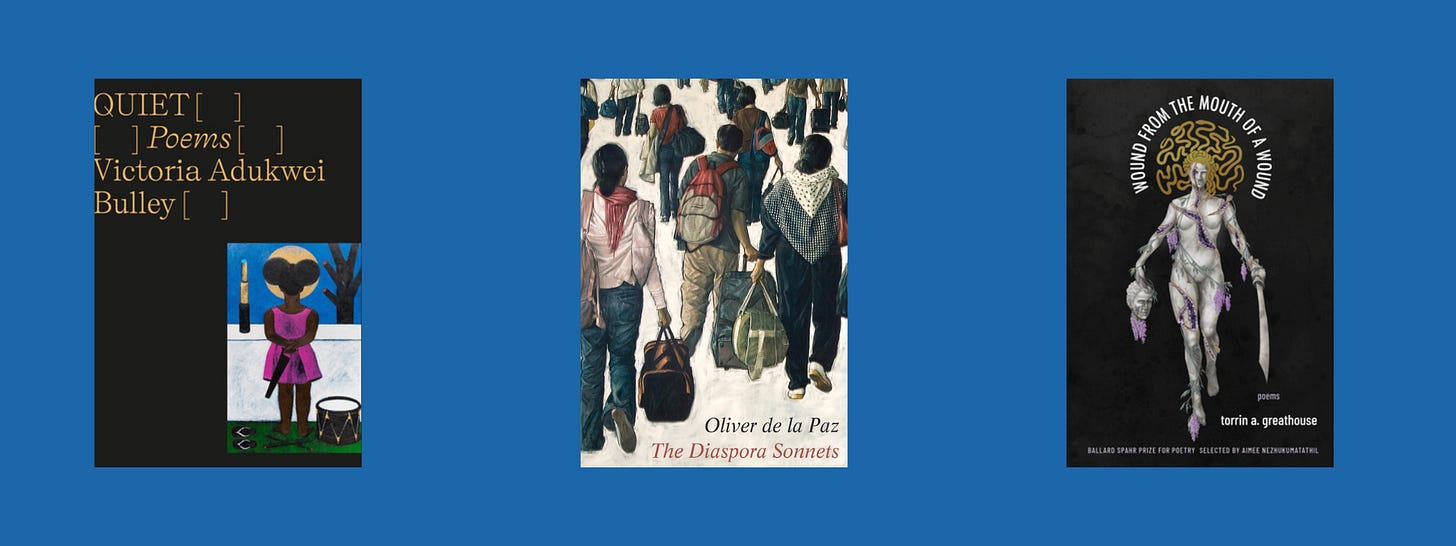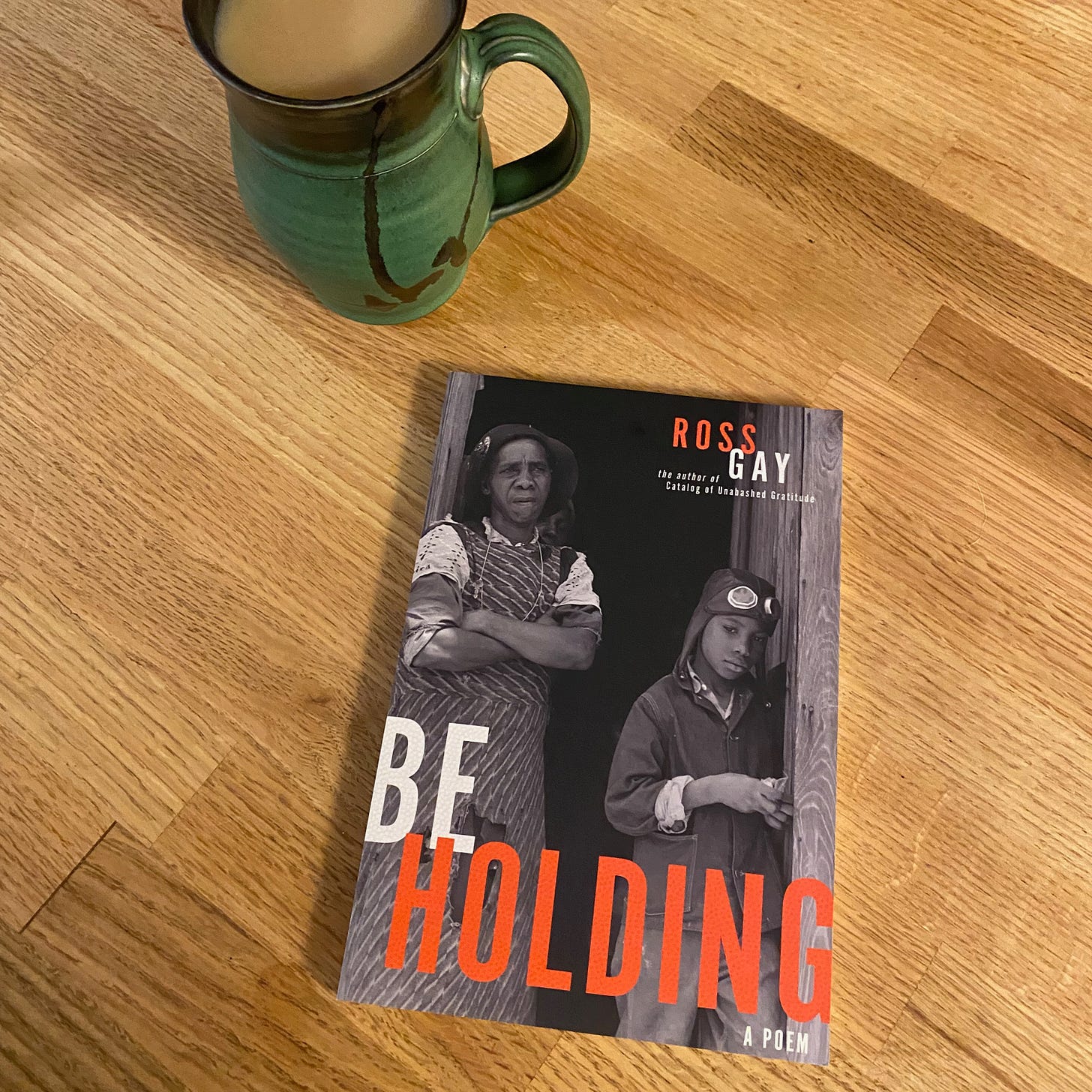Greetings, book and treat people! We’re deep in the Season of Light. I’m lighting the candles, walking on the ridge, reveling in winterberry, welcoming the darkness, calling my reps. This is the first of four Best of the Year newsletters you’ll receive from me before I take my annual end-of-year break in late December.
It’s also time for the last Queer Your Year raffle of the year! I haven’t been inspired to post or write much about it these last two months, but the challenge has brought me so much joy, and I hope it’s brought you some joy, too. I’d love to hear about the best books you’ve read because of it—feel free to drop them in the comments. I’ll be doing some end-of-year reflecting on Instagram. This month’s prize is a $20 gift card to a queer-owned bookstore of your choice. All the details about how to enter are here.
I’ll be walking a 10-mile section in the 25-Mile March of Palestine this Sunday. A coalition of local justice orgs have organized the event, and participants will “come together to march 25 miles – the length of Gaza – in an act of embodied solidarity with Palestinian people who have been forced from their homes, starved, bombed, and killed by the Israeli military, with the support of its biggest funder, the United States.” Local folks, maybe I’ll see you there.
I’ll also be at this night of vigil and action, organized by Vermont & New Hampshire Jewish Voice for Peace, on the first night of Hannukah. Local folks, maybe I’ll see you there.
I read a lot of amazing poetry this here. Here it is.
My Favorite Poetry of 2023
Some notes on the list:
It includes the best poetry I read in 2023, not just books published in 2023.
It’s organized by moods and themes.
It includes 35 books, because I don’t make Best Of lists with five or ten books on them. I go through my reading spreadsheet and make a list of every book I loved. That’s what this list is: all the poetry I loved this year.
You can browse through all these books via this handy list on Bookshop.
Clicking on a title will bring you to Bookshop. Clicking on linked text in the description will bring you to my review (either in the newsletter or on Instagram).
It’s only December 6th, so this list is not definitive. It also doesn’t include rereads. If it did, Catalog of Unabashed Gratitude would be on it!
Form Reformed
Plans for Sentences by Renee Gladman (2022): Sometimes I read a book of poetry that reminds me how truly outrageous and incredible it is that we are creatures who make words. The words in this book are whole worlds. The words in this book are beautiful castles, vast woodlands, intricate architecture. I could have read these poems forever, just for the feel of them in my mouth.
West: A Translation by Paisley Rekdal (2023): I don’t know how to describe this work of art. It’s a translation, an atlas, a map, a series of footnotes, a history of the Chinese Exclusion Act and the transcontinental railroad. It’s an act of witness and a doorway. It’s truly astonishing.
A Tinderbox in Three Acts by Cynthia Dewi Oka (2022): A book that defies coherence. It’s a play and a poetry collection and a story and an archive. One of the characters is a kind of ghost of history. There are maps covered in nearly-illegible writing, abstract drawings, strings of words in all caps that feel impossible to untangle.
Concentrate by Courtney Faye Taylor (2022): This is a searing, endless, complicated collection about the 1991 murder of Latasha Harlins, a fifteen-year-old Black girl who was shot by the owner of a Korean connivence store in LA.
An Infinity of Languages
Brother Sleep by Aldo Amparán (2022): These poems are about the grief of losing a brother, and living on a border, and displacement, and translation, and queer masculinity, and dreams. The language is so startling, so clear.
‘Āina Hānau / Birth Land by Brandy Nālani McDougall (2023): McDougall is a Kanaka ʻŌiwi poet who writes in these pages about her land and her people, the injustices they’ve faced, the continuing violence of colonialism, the deep love she has for the land and ocean and ecosystems that have raised and shaped her.
Return by Emily Lee Luan (2023): Poetry often feels like an attempt to translate what is not translatable, to put into words feelings that exist in the body, that are not easily legible or definable in any language. Emily Lee Luan’s astonishing debut directly addresses this tension: how does one write and live between languages and cultures?
Gifts from the 20th Century
Pictures of the Floating World by Amy Lowell (1919): This remarkable book contains some of the most erotic lesbian poetry I’ve read this year. Gorgeous, sexy love poems about moonlight, gardens, bodies. I have a review written that I’ll share at some point!
Remember by Joy Harjo, illustrated by Michaela Goade (text 1983, art 2023): Goade brings Joy Harjo’s 1983 poem ‘Remember’ to glorious life. It opens with the words: “Remember the sky that you were born under, know each of the star’s stories.” Every page from the first to the last is a stunning mess of color and movement, stars and plants, creatures and wind, as Harjo urges us to remember what connects us.
Harlem Shadows by Claude McKay (1922): These poems aren’t queer in the way that most contemporary readers define it. They are about many things: being homesick for Jamaica, everyday Black life in Harlem, waiters and dancers and sex workers, winter, flowers, moments shared with a lover, protest, racism in America, state violence. They are by turns playful and elegiac. I was not expecting to love them in the way I did.
(Re) Tellings, Inventions, Imaginings
Burning Like Her Own Planet by Vandana Khanna (2023): This is a stunning collection of poems about women, girls, and goddesses. Khanna reimagines the lives of Hindu goddesses, placing them in a variety of contemporary contexts. They are born and reborn, they struggle to make space for themselves in a world dominated by men, they rage, they wait and escape and tend and build their own worlds.
Buffalo Girl by Jessica Q. Stark (2023): A series of erasures, retellings, reimaginings, and complications of various Little Red Riding Hood stories. Stark uses the lens of fairy tale to tell haunting ghost stories and bodily histories, to explore Asian womanhood, migration, desire, danger.
Removal Acts by Erin Marie Lynch (2023): This is another collection I don’t know how to write about or translate. It’s about the reverberations of historical violence toward Indigenous people, the presentness of those reverberating moments. The poems take endless creative forms.
Perfects Lines That Cut Through All the Noise
The Diaspora Sonnets by Oliver de la Paz (2023): De la Paz’s writing is so precise, so sharp, each word weighted, his line breaks like little cliffs, his imagery surprising and inventive and full of movement. I read these sonnets over and over again and every time they broke me. De la Paz gets the sonnet to open and open and open and burst.
Quiet by Victoria Adukwei Bulley (2023): These poems are dense with interiority and movement. I felt acutely aware of my body while reading them. Partly this is because the rhythm and spin and density of her lines and images—they kept catching my breath.
Wound from the Mouth of a Wound by torrin a. greathouse (2020): Here is a poetics of teeth and limbs, a physical poetics full of verbs that gnash and tear and sting, a poetics that claims and insists on body as story, that refuses to give the story of the poet’s body to anyone else’s voice.
Love Letters That Hurt
We Borrowed Gentleness by J. Estanislao Lopez (2022): Who guides us and how do we guide? What happens when the guides we’ve looked to all our lives guide us into mess and violence? How do we guide our children, and how do they guide us? What guides us through a burning, flooded world?
Why Did You Leave the Horse Alone? by Mahmoud Darwish, translated by Jeffrey Sacks (2006): This is a book of love poems and landscape poems, poems about home and language, about being forced to leave home and longing for it. They are about the brutal history of the occupation, yes, the agony of exile, living through violence and how it destroys—but more than that, more deeply, these poems are a love letter to Palestine, to living and loving and walking in Palestine, to the memory of the beloved which cannot be dimmed or destroyed.
Short Film Starring My Beloved's Red Bronco by K. Iver (2023): An absolutely stunning collection about queer and trans grief, survival, futurity. It’s a conversation between queer past and trans present, between versions of self and love, between interior and exterior landscapes. It’s a mourning song, a breaking elegy, not only for what was, but for what was not
As She Appears by Shelley Wong (2022): A gorgeous collection full of longing and nature and messy, mended, fraying, vibrant, stitched-together relationships.
Rage Stories are Love Stories
1919 by Eve L. Ewing (2019): These poems about 1919 Chicago Race Riot take many forms—Bible verses, fables, lists. Ewing transforms and remakes an archive. She tells the story and the story behind the story and the story behind that one. Poetry opens in a way that prose can’t, and Ewing uses it to do something extraordinary. This book hurts and hurts and hurts. It is expansive and intimate, rooted and full of sky.
Dear God. Dear Bones. Dear Yellow. by Noor Hindi (2022): Another poetry collection that broke me open. How do I write about this one? It’s so raw. Boiling, tender. My god. The punctuation. I will be holding this one for a long, long time.
Rifqa by Mohammed El-Kurd (2021): This is a beautiful, devastating, rageful collection about surviving the impossibility, the brutality of displacement, exile, occupation, genocide. El-Kurd’s poems are clear and dancing; they cut and sing. They are liberation poems, survival poems, grief poems, everyday poems, poems of despair held, despair transformed.
The Tiny Journalist by Naomi Shihab Nye (2019): This book is poetry as refuge, poetry as a way to braid stories of resistance out of the brutality of occupation, poetry as roiling, incandescent, searing rage, poetry as demand.
Instructions for Playing & Praying
Freedom House by KB Brookins (2023): What a beautiful, wrenching, haunting, playful, loving rage song of a book.
More Sure by A. Light Zachary (2023): Oh, this sly and playful book! These fierce and striving poems! These declarations and reinventions and wonderings, these beautiful odes to trans complexity and queer joy, these geodes of becoming and unbecoming, these hard and lovely lines that break apart into untold layers, uncovering and recovering themselves, unwilling to be easily contained or neatly named.
Songs of Praise, Songs of Longing
Orders of Service by Willie Lee Kinard III (2023): This collection is about holy vessels, remade. It’s about the Southern Black church, about song and hymn and choir. Song as vessel for escape, hymn as vessel for praise, choir as vessel for what cannot be named.
Tunsiya-Amrikiya by Leila Chatti (2018): Girlhood between—languages, homes, memories. Muslim girlhood, girlhood of wildness, girlhood held gently in family, in food, in ritual. Girlhood torn by American violences, rewoven into untranslatable, powerful womanhood.
Theophanies by Sarah Ghazal Ali (2024): Oh, this collection opened and gutted me. The ghazals are especially stunning. But every poem—practically every line—felt to me like a precise and gentle cut. Oh, this is how the world is. Oh, this is how it hurts. Oh, this is how it sings.
Poukahangatus by Tayi Tibble (2022): Poukahangatus is about Māori girlhood, pop culture girlhood, girlhood in the age of Twilight and Instagram. Girlhood haunted by the girlhoods of mother, grandmother, ancestor, myth. Girlhood tangled with desire. Girlhood tied to family story, becoming story.
The World in the Body
Things I Didn’t Do With This Body by Amanda Gunns (2023): Body as vessel, body breaking. Body split open, body touched, body splintered, body sick, body longing, body still—everything the body holds, poemed.
Things You May Find Hidden in My Ear by Mosab Abu Toha (2022): Toha is a Gazan poet who writes about the destruction of his home and the beauty of his home, twining them together in ways that break and break but also sing. His poems are full of images that crack impossibly against each other.
Trace Evidence by Charif Shanahan (2023): This collection is cerebral and preoccupied, full of repeating words and images. Yet it is also so deeply of the body: how it feels to live inside skin, to long to shed that skin, to move through days. Shanahan is so sharp, so tender, so curious. Poems about sex, queer desire, familial breakages, longing for “the answer”, internal and external knowledge, the messy contradictions of racialized identity—are all speaking to each other.
This One Is Its Own Category
Rain Makes Applesauce by Julian Scheer & Marvin Bileck (1964): Pure whimsy. Pure wonder. Pure joy. I can’t explain how wildly I love this book. I opened it thinking I would like it because it has a wonderfully strange cover and I love the title. By the time I got to the end, I knew I had underestimated my capacity to love children’s books. I love this book with the kind of abandon I thought was reserved only for my most sacred novels. How humbling, how joyful, to be wrong.
And This One Remakes the World
Be Holding by Ross Gay: This is a work so buoyant and new I know I’ll never be done with it. It’s a book-length poem about basketball, but really it’s about flight and Blackness and photography and how we look and don’t look and see and don’t see and the practice of holding and beholding. I don’t pick favorites, but I’m not saying this isn’t the best book I read this year.
If you’re looking for even more poetry recs, check out my reviews of every collection I read for The Sealey Challenge this year. I’ll be back in your inboxes on Friday with my favorite nonfiction of the year!


















I really need to read more poetry so this is useful
Hoping i remember to finish my QYY card for the year & send it in, but the main book i want to mention is Any Other City. Definitely one that was on my TBR but the QYY challenge (read a book from Arsenal Pulp) made me pick it up instead of letting it sit there forever. And it didn't totally grab me in the beginning, but quickly became a fave for the year. Tracy 💙💙💙